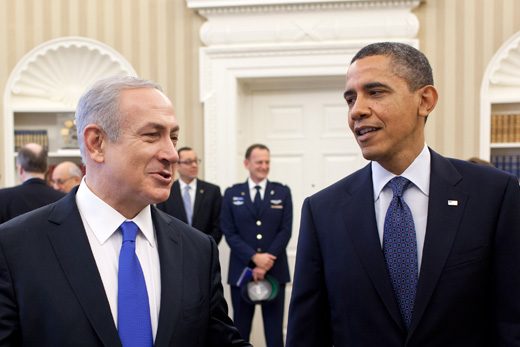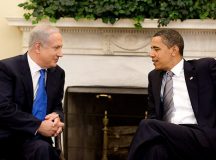There is no alternative to the two-state solution, but neither party is yet in a position to make the deal.
Conventional wisdom says that time is running out on a two-state solution to the Israel-Palestinian conflict. The opposite is more nearly correct. While a two-state solution remains, and will remain for the foreseeable future the only feasible solution, the conflict is not yet soluble.
The imaginable terms of a settlement were embodied in the 2000 ‘Clinton Parameters’ or the deal proposed to Palestinian Authority President Mahmoud Abbas by then-prime minister Ehud Olmert in 2008. The current Israeli government is unlikely to offer as much (for example, shared sovereignty over Jerusalem) and in any event, Abbas spurned Olmert’s offer.
Today, circumstances are less propitious than they were in 2008. The Arab Spring may in the long run eventuate in a more liberal, humane, and pacific dispensation in the Arab world. However, so far the main product has been a wave of Islamism: illiberal, inhumane, and redolent of violence. In a best case scenario, the spirit of Sidi Bouzid and Tahrir Square somehow subdues the Islamist surge and at least two countries, Tunisia and Egypt, emerge as liberal democracies setting an example that influence others. But it is at least as likely that an era of darkness descends on the Arab world – a Sunni version of Khomeinism. The twentieth century saw many bad regimes succeeded by worse ones. It could happen again. How long an Islamist era might last, no one knows.
The specter of Islamist hegemony constrains both Israelis and the Palestinians. The experience of Gaza and south Lebanon makes it difficult for Israelis to picture withdrawing from the West Bank. True, a negotiated withdrawal would be different from the unilateral ones from Gaza and south Lebanon. But would whatever promises and guarantees Israel received hold up in the event of a Hamas takeover of the West Bank? Or of an Islamist takeover of Egypt, Syria, Jordan?
On the other side, Abbas, who in contrast to Yasser Arafat seems to be a man of peace, has never felt he had the political strength to strike a deal that means telling his people that the conflict is over; that Jaffa and Acre will never be theirs again; that there will be no Palestine ‘from the river to the sea’; that it is time to forget heroic visions and settle down to the mundane work of state-building. On Israeli television recently, Abbas seemed to forsake the ‘right of return’ only to have his spokesmen retract the implication within a day. The distancing from the comment did not spare him from repudiation by Marwan Barghouti, who reaffirmed in a prison interview that this right was ‘sacred’. Although imprisoned, Barghouti continues to score far higher than Abbas in Palestinian polls, and Barghouti is a Fatah man. Needless to say, Hamas is even further from peace.
Can, should, will the United States exert itself to break the impasse? The argument that American influence is in decline is usually overstated. Claims of American decline were numerous in the 1980s, spearheaded by the historian Paul Kennedy. His observation – that the United States was exhausting itself with Cold War exertions proved exactly correct – except he got the country wrong: it was not America but America’s adversary to whom it applied. Today, America is exerting less influence in the Middle East by choice because that is the ideological bent of our current president and the popular backlash against the Iraq War. Neither this presidency nor this mood will last forever, and America’s underlying power, or potential power, has not eroded significantly.
However, more activist presidents at more favorable moments have flailed at this problem in vain. Israeli-Palestinian peace was Bill Clinton’s chief foreign policy goal and George W. Bush gave it his best shot in the Annapolis process of 2007. Barack Obama, who tried and failed in his first term, may give it another go, but he is unlikely to crack the code. He has other regional issues looming: Iran’s nuclear drive, the prospective disintegration of Syria, and a rapid withdrawal from Afghanistan that is likely to bring some vertiginous moments or worse.
The real challenge for Western policy is to do whatever can be done with the limited leverage we have to prevent a long night of Sunni Islamism from falling over the region. Success in this will serve our interests in many respects and benefit the people of the region, and it is also the most useful thing that can be done to bring Israeli-Palestinian peace closer. To engage with the Egyptian Muslim Brotherhood or Tunisia’s Ennahda in the hope of coaxing them toward moderation is all to the good, so long as we remain clear-eyed about the repugnance of their core ideology and that we do nothing to pull the rug out from under the liberals and secularists who are our true allies and the region’s best hope. Our top priority should be to strengthen them, even while we try to influence the Islamists, using the carrots and sticks we possess.
And what about that putative hour-glass on the peace process? Presumably those who say time is running out mean that the increase and expansion of Israeli settlements will eventually make a viable Palestine impossible. But settlements can be uprooted as well as implanted. Indeed, they were uprooted from the Sinai in 1979 and from Gaza and the Northern West Bank in 2005. In a peace agreement many settlements will have to be evacuated and others consolidated. It will be a wrenching process for Israel, but (as a wise Palestinian peace-advocate pointed out to me recently) resettling Israeli settlers within the Green Line or within consolidated settlements that remain Israeli in a peace agreement will be easier than resettling Russian or Ethiopian immigrants. Israel is the most accomplished country on earth in population absorption. That it will nonetheless be difficult is a strong reason why Israel would be wise to constrain settlement growth now while waiting for peace prospects to brighten.





































